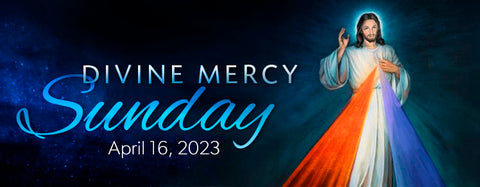Divine Mercy Sunday is a very important day for Catholics around the world. This day, which falls on the second Sunday of Easter, is a celebration of God's mercy and love. It was established by Saint Pope John Paul II in the year 2000, and it holds a special place in the hearts of many Catholics. The significance of this day cannot be overstated, as it reminds us of God's infinite love and mercy for us.
The idea of Divine Mercy Sunday was revealed by Our Lord Jesus Himself to a Polish nun named Saint Faustina Kowalska. In the early 20th century, she received a series of visions of Our Lord Jesus, who appeared to her as the "King of Divine Mercy." In these visions, Jesus asked Saint Faustina to spread the message of His mercy to the world. He revealed to her that the Feast of Mercy should be celebrated on the Sunday after Easter. Saint Faustina wrote about these visions in her diary, which she titled "Divine Mercy in My Soul." Her writings were instrumental in bringing the message of God's mercy to the world.
Saint Faustina's diary is filled with messages about God's mercy and the importance of Divine Mercy Sunday. In one entry, Jesus said: "My daughter, tell the whole world about My inconceivable mercy. I desire that the Feast of Mercy be a refuge and shelter for all souls, and especially for poor sinners. On that day the very depths of My tender mercy are open. I pour out a whole ocean of graces upon those souls who approach the fount of My mercy. The soul that will go to Confession and receive Holy Communion shall obtain complete forgiveness of sins and punishment."
In another entry, Jesus said to St. Faustina, "The flames of mercy are burning Me – clamoring to be spent; I want to keep pouring them out upon souls; souls just don't want to believe in My goodness."
Saint Pope John Paul II was deeply inspired by Saint Faustina's writings and her message of God's mercy. He saw the need for a special day to celebrate this message, and so he established Divine Mercy Sunday in the year 2000. In his homily at the canonization of Saint Faustina, he said, "It is important then that we accept the whole message that comes to us from the word of God on this Second Sunday of Easter, which from now on throughout the Church will be called 'Divine Mercy Sunday.'"
One of the central messages of Divine Mercy Sunday is the idea of forgiveness. As Jesus said to Saint Faustina, "The soul that will go to Confession and receive Holy Communion shall obtain complete forgiveness of sins and punishment." This means that if we confess our sins and receive the Eucharist on Divine Mercy Sunday, we can gain a plenary indulgence, which is the complete remission of the temporal punishment due to sin. This is a powerful opportunity to receive God's mercy and to be completely freed from the effects of our sins.
In addition to these requirements, there are other ways to celebrate Divine Mercy Sunday. One can pray the Divine Mercy Chaplet, which is a series of prayers that Saint Faustina received from Jesus. The Lord Jesus has given amazing promises to those who recite the Divine Mercy Chaplet.
Another way to celebrate Divine Mercy Sunday is to perform acts of mercy, such as visiting the sick, feeding the hungry, or giving to the poor. These acts of mercy are a tangible way to live out the message of God's mercy and to share it with others.
In conclusion, Divine Mercy Sunday is a significant day for Catholics around the world. It is a celebration of God's infinite love and mercy, as revealed to Saint Faustina and established by Saint Pope John Paul II. Through Confession and Holy Communion, we can gain complete forgiveness of sins and punishment, and receive a plenary indulgence.
The message of God's mercy is a powerful one, and it is our duty to share it with others and to live it out in our daily lives. As Saint Faustina wrote, "O my Jesus, each of Your saints reflects one of Your virtues; I desire to reflect Your compassionate heart, full of mercy; I want to glorify it. Let Your mercy, O Jesus, be impressed upon my heart and soul like a seal, and this will be my badge in this and the future life."
May we all strive to reflect God's merciful heart and to spread His message of love and forgiveness to the world.

